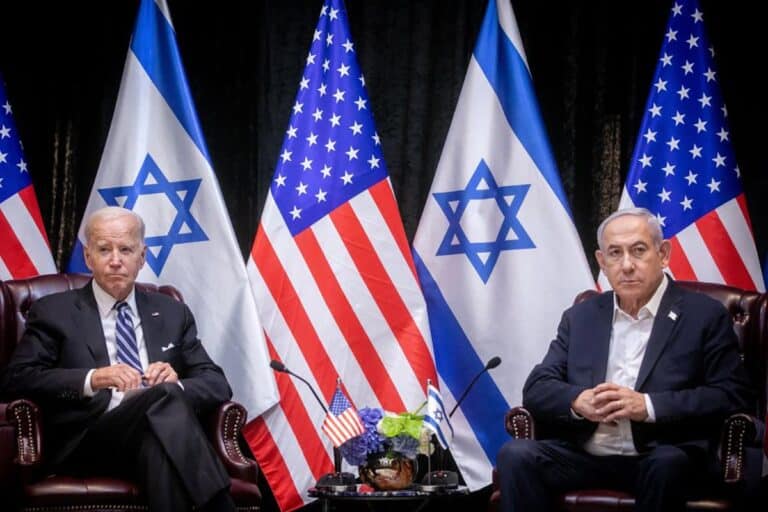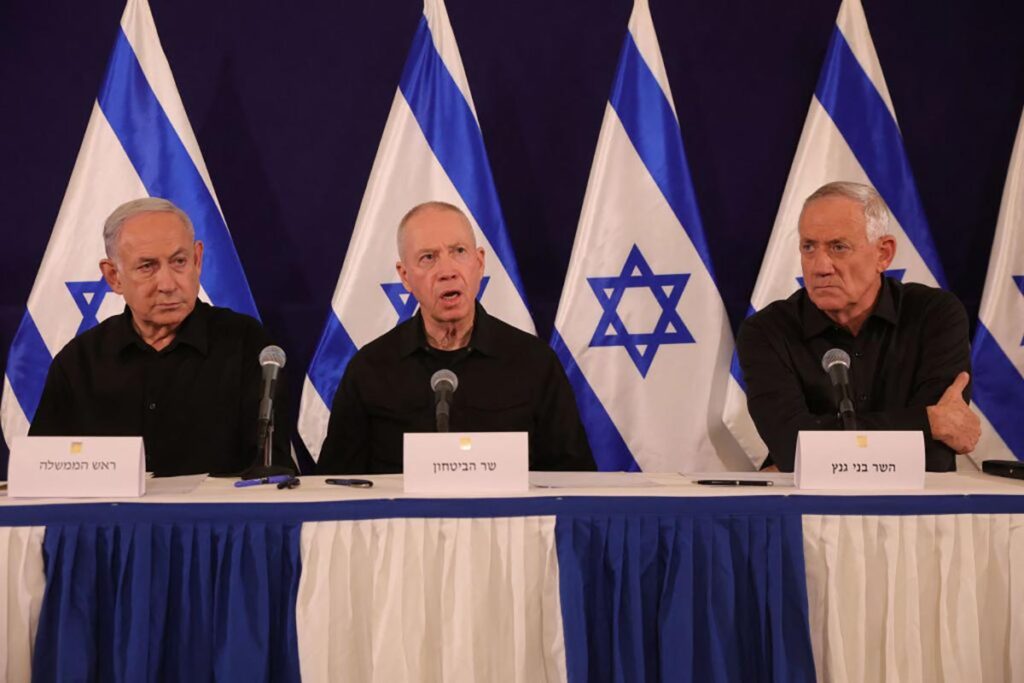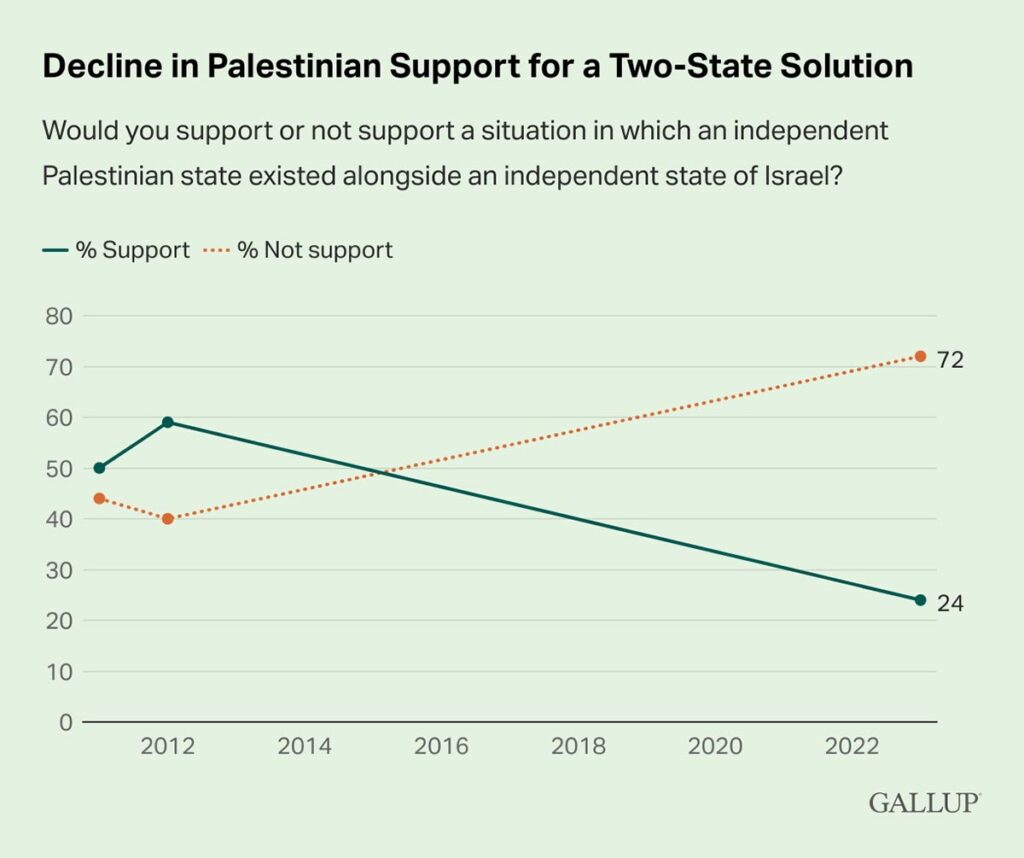
As U.S. officials and the international community repeatedly call for a “day after” plan that would lead to the establishment of a Palestinian state, Prime Minister Benjamin Netanyahu has emphasized that he is opposed to such a vision.
“I will not compromise on full Israeli security control over all the territory west of the Jordan [River] — and this runs contrary to a Palestinian state,” Netanyahu recently said. However, the prime minister has not explicitly stated that he opposes a demilitarized Palestinian state.
U.S. President Joe Biden recently said that he believes the creation of a Palestinian state is “possible” while Netanyahu is in office, with the U.S. president emphasizing that “there are a number of types of two-state solutions.”
POTUS on why he thinks a two state solution is possible with Bibi in power: https://t.co/bOGPDJt0hc pic.twitter.com/4zhoArwBvG
— Weijia Jiang (@weijia) January 19, 2024
Meanwhile, Israeli officials are reportedly creating a 1-kilometer-wide buffer zone on the Gaza side of the border between the Strip and Israel.
The purpose of the buffer zone is to serve as a security measure in both the short- and long-term, part of a plan to “demilitarize Gaza and assure Israelis that they can return safely to the towns and communities near the border that were evacuated after the Oct. 7 attack,” the Wall Street Journal reported.
תצלומי לוויין עדכניים מהסופ"ש מראים את פעילות החישוף בתוך רצועת עזה, בקרבת הגבול עם ישראל.
— avi scharf (@avischarf) January 24, 2024
לפרשנות של @AnshelPfeffer
בהיעדר החלטה על היום שאחרי, צה"ל מקים ברצועה אזור חיץ, אך הבעיות עלולות לגבור על התועלתhttps://t.co/HxIbL8Dfal pic.twitter.com/xqkkt2OtfN
The U.S. and international community oppose the buffer zone, with National Security Council spokesman John Kirby saying on Tuesday, “We do not want to see the territory of Gaza reduced in any way.”
With Israel and the international community including its closest allies at odds over what should happen after the war, let’s unpack the situation.
Increasing calls for a two-state solution from the international community
Until recently, international calls for a two-state solution were more of an ideological, theoretical position than a practical call to action. However, the shocking disintegration of the status quo in the wake of the Oct. 7 attacks changed that.
In recent weeks, top officials from countries worldwide, including from the U.S. and Europe, have stated that the ideal outcome of Israel’s war against Hamas is the ultimate creation of a Palestinian state, condemning Netanyahu’s stance on the matter.
Netanyahu is “a good friend, but I think he has to change,” President Biden said in December 2023. “You cannot say there’s no Palestinian state at all in the future.”
“We have to work toward bringing Israel together in a way that provides for the beginning of… a two-state solution,” he added.
A two-state solution is the only way to guarantee the long-term security of both the Israeli and the Palestinian people.
— President Biden (@POTUS) November 26, 2023
To make sure Israelis and Palestinians alike can live in equal measures of freedom and dignity.
We will not give up on working toward this goal.
“The declarations of Benjamin Netanyahu are worrying,” French Foreign Affairs Minister Stephane Sejourne said earlier this week. “There will be a need for a Palestinian state with security guarantees for all.”
The international calls have come from leaders across the political spectrum, including Brazil’s left-wing leader President Lula de Silva and Italy’s right-wing leader Premier Giorgia Meloni.
What do Israeli leaders think about a two-state solution?

Netanyahu said that he has opposed the creation of a Palestinian state for years because it “would have constituted an existential danger to Israel.”
Ministers in Netanyahu’s government have recently reiterated their opposition to a two-state solution, with Finance Minister Bezalel Smotrich saying on X on Jan. 20:
“The push for the establishment of a Palestinian state is a push for the next massacre…The White House needs to wise up on the concepts that led to [this] national disaster in Israel.”
יש בישראל הסכמה רחבה נגד מדינה פלסטינית וחלוקת הארץ. ידידיה של ישראל צריכים להבין שהדחיפה להקמת מדינה פלסטינית היא דחיפה לטבח הבא חלילה ולסיכון קיומה של מדינת ישראל.
— בצלאל סמוטריץ' (@bezalelsm) January 20, 2024
כמו שקרה בישראל, גם בבית הלבן צריכים להתפכח מהקונספציות שהובילו לאסון הלאומי של ישראל.
Where do other Israeli leaders stand? Prior to Oct. 7, Israeli President Isaac Herzog, war cabinet member Benny Gantz, and opposition leader Yair Lapid had all expressed some degree of support for a two-state solution to create lasting peace in the region.
“An agreement with the Palestinians based on the two states for two people is the right thing for Israel’s security, economy, and for the future of our children. Peace is not a compromise; it is the most courageous decision we can make,” Lapid said in September 2022.
Since the war began, however, all three leaders have reportedly urged the Biden administration to tone down its public rhetoric regarding the need for a two-state solution, emphasizing the current position of the country and lack of popular support for the framework.
“What I want to urge is against just saying ‘two-state solution.’ Why? Because there is an emotional chapter here that must be dealt with. My nation is bereaving. My nation is in trauma,” Herzog explained in an interview with The Associated Press.
However, some left-wing Knesset members have continued to support the framework. Labor party MK Gilad Kariv recently said, “The events on Oct. 7 didn’t change our basic belief. The only way to secure the ability of the two national communities that are sharing the same piece of land to live in peace and prosperity is the two-state solution.”
Does the Israeli public support a two-state solution?
Recent polls have found that most Israelis do not support a Palestinian state, marking a shift in the national consensus over the past decade.
An Israel Democracy Institute poll published in December 2023 asked Jewish Israelis whether Israel should pursue a two-state solution in exchange for U.S. assistance.
While 35% of the Jewish Israelis surveyed said yes, 52% opposed a two-state solution “even at the risk of losing U.S. assistance.”
A Gallup poll also published in December 2023 revealed similar findings. Only 25% of the Israelis surveyed supported the existence of an independent Palestinian state, while most (65%) opposed it.
“This is almost a complete reversal of where they stood on the issue a decade ago, when twice as many Israeli adults supported an independent Palestinian state (61%) as opposed one (30%),” Gallup noted.
In many Israelis’ eyes, the establishment of a Palestinian state would not only present a serious security threat but would effectively reward Hamas for their brutal attacks on Oct. 7.
“A two-state solution after what happened on Oct. 7 is a reward to Hamas,” an unnamed Israeli official explained to The Times of Israel.
“Netanyahu is the one saying it loudly and bluntly, but there truly isn’t any appetite right now in Israel across the political spectrum for the idea of two states,” the official added.
Additionally, the trauma experienced by Israelis on Oct. 7 cannot be understated. The impact of the attacks on Israeli society has depleted Israeli popular support for a two-state solution primarily due to security concerns.
President Isaac Herzog explained Israeli sentiments this way, saying at the World Economic Forum in Davos earlier this month:
“If you ask an average Israeli now about his or her mental state, nobody in his right mind is willing now to think about what will be the solution of the peace agreements, because everybody wants to know: Can we be promised real safety in the future?… Israel lost trust in the peace processes because they see that terror is glorified by our neighbors.”
Declining support for a two-state solution among Palestinians
Support for a two-state solution has significantly decreased among Palestinians as well. A Gallup poll published in Oct. 2023 — conducted before the Oct. 7 attacks — found that only 24% supported a two-state solution, down from 59% in 2012.

Meanwhile, a poll conducted by the Palestinian Center for Policy and Survey Research gaged Palestinian attitudes post-Oct. 7.
When they were asked about “the best means of achieving Palestinian goals,” 24% said “negotiations” and 19% said “peaceful popular resistance,” while 56% chose “armed struggle.”
Alarmingly, the same poll found that the vast majority of Palestinians (72%) believe Hamas was justified in their Oct. 7 attack in which 1,200 people were killed and 250 people were taken hostage. Read more about what Palestinians think of Hamas.
The Palestinian Authority — which currently governs the West Bank but faces a significant decline in public support — acknowledges Israel’s right to exist and has participated in peace negotiations with Israel. However, the PA has yet to officially condemn the Oct. 7 attacks.
Hamas, which has governed the Gaza Strip since 2007, is recognized as a terror group by several countries, including the U.S. It is committed to the destruction of Israel to create an independent Palestinian state and does not recognize Israel’s right to exist.
A disconnect between Israelis/Palestinians and the international community
Despite the serious lack of support for a two-state solution among both Israelis and Palestinians, the international community continues to assert that such a solution is necessary for lasting peace in the region.
“The whole world has agreed that the two-state solution is the best way forward,” British Defense Secretary Grant Shapps asserted on Jan. 31.
Recent polling data shows a clear disconnect between the international desire for a two-state solution and the perspectives of Israelis and Palestinians.
Given the lack of popular support among both Israelis and Palestinians, the current Israeli governing coalition, and the lack of a cohesive Palestinian governance that is willing to enter such negotiations, prospects for a two-state solution remain slim despite the international outcry.
Originally Published Jan 26, 2024 01:30PM EST
